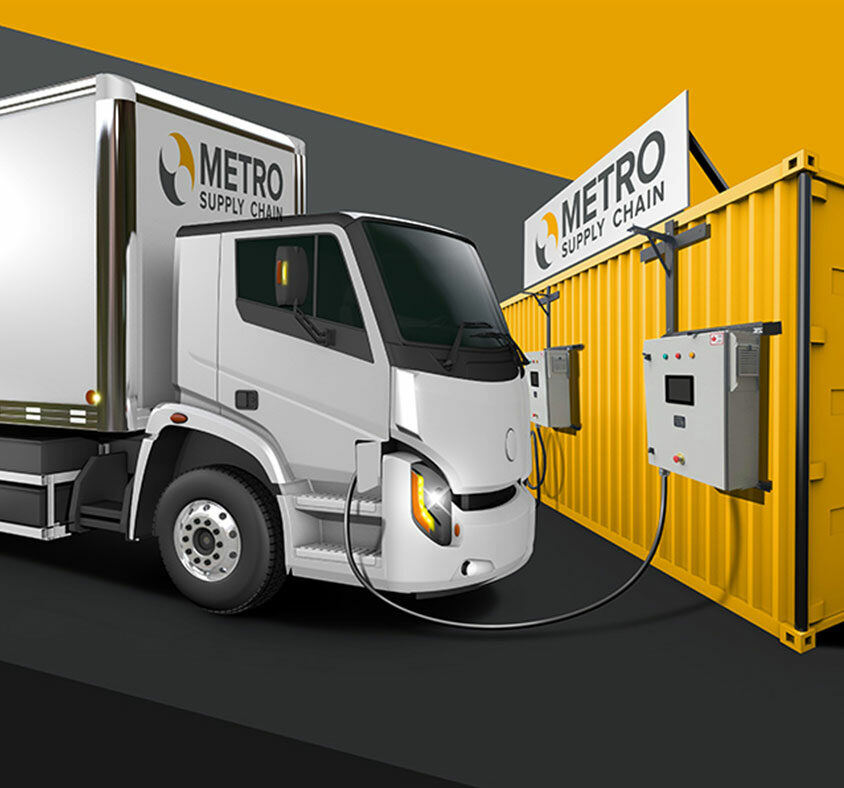By Thayani Dayahparan, Principal Solutions and Innovation Architect, Metro Supply Chain
The clock is ticking for Canadian-based logistics companies to transition their fleets to electric vehicle (EV) trucks. The Canadian government is targeting that by 2040 all medium- and heavy-duty trucks sold in Canada will be zero-emission. However, given how much more environmentally conscious consumers have become, it’s likely firms will need to go entirely EV well before that date. With more auto manufacturers developing EVs, and battery technology continuing to improve, companies should find it easier to purchase zero-emission commercial vehicles in the coming years. Finding places to charge those vehicles, though, may be a challenge.
According to Natural Resources Canada, there are currently 6,608 charging stations across the country, but a few are the type of superchargers that trucks require for rapid recharging. While trucks can use standard chargers, it would take hours before they could get back on the road. Improvements are coming through the Zero Emissions Vehicle Infrastructure Program, the government pledges to invest $280 million by 2024 into creating EV charging stations. However, the program is more focused on passenger vehicles and putting stations in more densely populated areas, which doesn’t serve EV class 5 and above fleets well.
Given that the transportation sector accounts for at least 25% of greenhouse gas emissions in Canada – with freight emissions totalling 42% of that number – there needs to be more concerted effort invested into developing the EV infrastructure for Canada’s growing logistics sector. [Read more about how carbon emissions are stressing our climate in Metro Supply Chain’s latest white paper: Driving fleet electrification forward: a guide to zero-emissions last-mile delivery]
I recently spoke with Daniel Breton, President and CEO of Electric Mobility Canada, who says “there’s no reason why the country can’t put more heavy-duty-focused infrastructure in place”. He points to Shenzhen, China, where 100% of the area’s urban buses are electric, while other countries, such as Norway, are rapidly deploying DC fast-charging stations across the country. “It’s doable because we know it’s being done in other parts around the world,” he explained. “For us to say that it’s too complicated, or we can’t do it, to me, that shouldn’t be an issue.”
Complex infrastructure
Building the infrastructure that’s needed will likely have to be accomplished by both the private and public sectors. Companies like ours can create some stations that enable last-mile deliveries in core areas of a city, but it’s much harder to support long-haul shipments that require refuelling on Canada’s highways. Businesses also need incentives to build their own infrastructure, and currently, there aren’t many programs that can help offset the $100,000+ cost of charging units. The programs that do exist are cumbersome to apply for and it can take months for a response.
At the same time, these are highly complicated projects that, unlike traditional gas stations, can’t always be replicated across the country. For instance, a charger in Montreal, where it’s colder and gets a lot of snowfall, needs to be sealed in a different way than a unit in Vancouver, which rarely contends with frigid temperatures. Not all chargers work equally, either. Even how a truck pulls up to a charger needs to be taken into consideration.
Setting up stations
Canada’s infrastructure gap will no doubt result in slower EV adoption among fleet operators. For Metro Supply Chain, however, it means starting to build out our own charging capabilities. We recently took possession of six heavy-duty class 6 EVs in 2021, and we’ll be purchasing more in the coming year and will continue to expand further to support our goals and that of our customers. Over time we hope to transition our full fleet to zero-emission, which means we need the infrastructure now. In 2021, we built chargers in two warehouses, one in Vancouver and one in Montreal, and we hope to create more across the country.
While it’s been easier for us to continue electrifying our fleet through partnerships like the one we struck with IKEA to provide its customers with zero-emission delivery, our journey has not been without its challenges. For example, in Vancouver we found ourselves in a predicament, we were in the midst of moving from one warehouse to another. Installing, removing and then reinstalling the chargers is incredibly expensive, so we designed and created a custom mobile charging station that can easily be moved and would support our changing business needs. While we’re still testing these chargers, we’re hopeful they can fill in some infrastructure gaps as these stations can be moved where they are most needed.
It may still be years before EV trucks can crisscross the country as easily as the internal combustion engine vehicles do now, but that day is coming – it has to. If Canada wants to slash its emissions to zero by 2050, we will need reliable charging for the logistics sector. In the meantime, with more of our customers wanting to cut their own emissions, there’s an opportunity for us to take a lead in innovating infrastructure solutions that will drive the whole industry forward.
About Metro Supply Chain
Metro Supply Chain is a strategic supply chain solutions partner for some of the world’s fastest growing and most recognizable organizations. Managing more than 12 million square feet in over 96 sites across North America and Europe with a team of 6,000, it is the largest privately-owned supply chain solutions company based in Canada. For almost 50 years, Metro Supply Chain’s scale, wide capabilities and entrepreneurial structure has enabled it to meet its customers’ most challenging supply chain needs, including the creation of complex e-commerce fulfillment and last-mile delivery networks.
Related Posts
How to optimize your big and bulky last-mile delivery service
How the right change management program is key to transformation
Driving customer satisfaction through real-time analytics
Archived Posts
- september 2024
- january 2024
- february 2024
- march 2024
- may 2024
